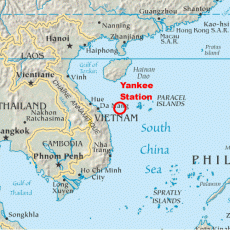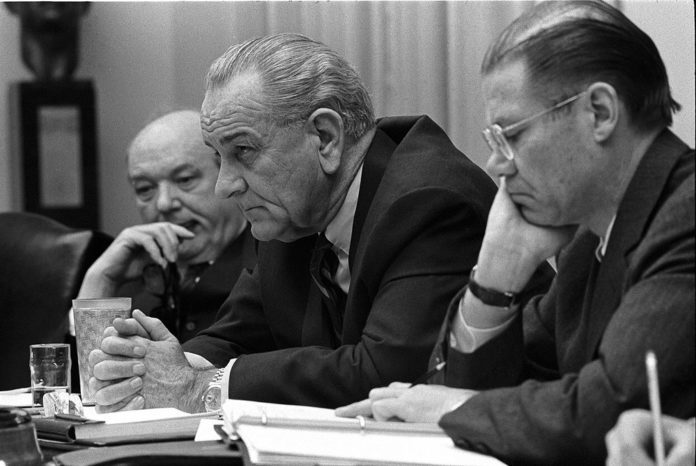First of Two Parts
BY RICHARD L. FRICKER
 I’m in the Centennial Lounge of Tulsa’s VFW Post 577, lots of vintage rock on the jukebox. There’s only me, and a few thousands ghosts. There’s a wooden stool a couple of chairs down reserved for ghosts and memories.
I’m in the Centennial Lounge of Tulsa’s VFW Post 577, lots of vintage rock on the jukebox. There’s only me, and a few thousands ghosts. There’s a wooden stool a couple of chairs down reserved for ghosts and memories.
There’s a black cover, a helmet and boots that occupy this stool. This stool is for the fallen, from all this nation’s wars. It’s their bar stool and theirs alone, they earned it.
For me, the stool has special meaning this month; Aug. 6, 2014 was an anniversary. Fifty years ago Congress passed the Gulf of Tonkin Resolution that took us into the lifelong hell known as the Vietnam War.
The short version of history is: On Aug. 4, 1964, two U.S. Navy destroyers, the Maddox and Turner Joy, were running electronic surveillance, called elint, along the coast of Vietnam. They reported coming under fire by North Vietnamese patrol boats. The reports were flashed to the Pentagon.
Secretary of Defense Robert McNamara told President Johnson and plans were put in motion for a retaliatory air strike. What McNamara didn’t tell Johnson was that Naval commanders were having doubts as to whether or not an attack had actually occurred.
Johnson himself had doubts and asked for re-conformation. McNamara confirmed and, basically the war was on.
The president told the American people, “After consultation with the leaders of both parties in the Congress, I further announced a decision to ask the Congress for a resolution expressing the unity and determination of the United States in supporting freedom and in protecting peace in Southeast Asia.”
It should be understood that Vietnam at the time was embroiled in its own civil war. The country had been divided into North and South following the French defeat only 10 years earlier at Dien Bien Phu.
The North Vietnamese had moved from a guerilla band attempting to throw out French colonial interests to a full-blown army under the leadership of one-time school teacher General Vo Nguyen Giap. After a 57-day pitched battle the French were forced to capitulate and the colonial era of Indochina came to an end.
Gen. Giap and North Vietnamese Ho Chi Minh were seen as ardent Communists seeking the overthrown of western democracy. Others saw them as nationalists seeking to establish a destiny for a united Vietnam.
The North Vietnamese victory over the French and the later discontent with South Vietnam gave rise to what became known as the “Domino Theory.” This theory suggested that one communist victory would act as a domino that would eventually cause the downfall of all western allies in Southeast Asia.
Therefore, it made sense to the American people when Johnson continued his televised presentation, saying, “As I have repeatedly made clear, the United States intends no rashness, and seeks no wider war. We must make it clear to all that the United States is united in its determination to bring about the end of Communist subversion and aggression in the area.”
On Aug. 7, 1964, Congress approved the resolution that became the legal rationalization for the Vietnam War. Even though Johnson had assured the American people and the world the U.S. “seeks no wider war” that’s exactly what they got to the tune of 58,000 U.S. service men and women killed in action. The wounded will never be accurately counted. And the others that carry the mental scares and fill hospitals, live under bridges, occupy prison cells – that number is beyond social math.
In this place, this VFW bar with vintage rock bouncing off the walls, memories can flood the mind. Each vet has a lifetime of stories.
 At the time the Tonkin Resolution was passed, the oldest son of Senior Chief Petty Officer Richard T. Fricker, and his former wife, Wilma, was serving aboard the USS Columbus [The Tall Lady] CG-12, the flagship of Cruiser Destroyer Flotilla 11. Young Fricker was a seaman in the radar gang which had the impressive designation Combat Information Center, Operations Intelligence Division, or CIC. Every ship had one.
At the time the Tonkin Resolution was passed, the oldest son of Senior Chief Petty Officer Richard T. Fricker, and his former wife, Wilma, was serving aboard the USS Columbus [The Tall Lady] CG-12, the flagship of Cruiser Destroyer Flotilla 11. Young Fricker was a seaman in the radar gang which had the impressive designation Combat Information Center, Operations Intelligence Division, or CIC. Every ship had one.
One day after the resolution passed, the Columbus left San Diego. By mid-August she was on station in the Gulf at [17° 30′ N and 108° 30′ E.] “Yankee Station.” It became the hub of air and sea operations for the remainder of the war.
Just south of Yankee Station, Point Yankee officially, aircraft carriers would launch patrols that would be handed off to Columbus or one of her destroyers. U.S. planes were not the only ones in the air, and that made life interesting from time to time.
The Lady did a few interesting things best left as sea stories. The difference between a sea story and fairytale is simple: A fairy tale begins with “once upon a time,” a sea story with “this ain’t no s—t.”
Eventually the tour ended and Columbus came home to San Diego.
The Columbus was sent to the East Coast; for her the war was over. Many of her crew were reassigned throughout the fleet, many for a second tour to the Gulf.
The Johnson/McNamara War became President Richard Nixon’s war. As it trudged on the country was being torn asunder. Ironically Nixon was forced to resign the presidency on Aug. 8, 1974, 10 years out from the Tonkin Resolution.
The war had been over for two years. Global television was replete with film of U.S. helicopters crashing into the sea as Vietnamese refugees fled Gen. Giap’s army as it took control of the capital, then call Saigon.
The war was over – 58,000-plus Americans dead, countless Vietnamese military and civilians in the body count. McNamara, meanwhile, was never called to account for his lie or the death, social upheaval and misery it caused.
So it is, VFWs, not only here, but across the nation, have become a repository for memories and ghosts. Citing the anniversary the resolution, past VFW President Steve Porter made note of the anniversary.
Porter describes himself as “one of Uncle Sam’s Misguided Children [USMC].” He asked the patrons gathered to hear the jazz ensemble to join in a shout of “Hell No We Won’t Go” – which they did.
The war that started 50 years ago fades into history or perhaps it was only yesterday, depending on your frame of mind on a given day. The wooden stool, stands as a silent reminder of the war and the lie.
Just as there was no attack that August night in 1964, there were no Weapons of Mass Destruction in Iraq, there was no Iraq-al Qaeda connection. The stool stands as silent testament for those felled by President George Bush’s lie.
This anniversary, this stool, these men and women who drift in and out with their stories and memories, brings to mind the Greek writer Simonides’ epitaph to the Spartans who died at Thermopylae: “Go tell the Spartans, stranger passing by, that here, obedient to their laws, we lie.”
The best this sailor has for McNamara? Sierra Mike Foxtrot [SMF], and I mean every word.
For the men and women, serving and civilian state side, Bravo Zulu [Well Done] and I mean every word.
Sometimes anniversaries can be a bitch. I think it’s time for a drink.
– Richard L. Fricker lives in Tulsa, OK, and is a regular contributor to The Oklahoma Observer. His latest book, The Last Day of the War, is available at https://www.createspace.com/3804081 or at www.richardfricker.com.
E-mail: richardfricker@okobserver.org








